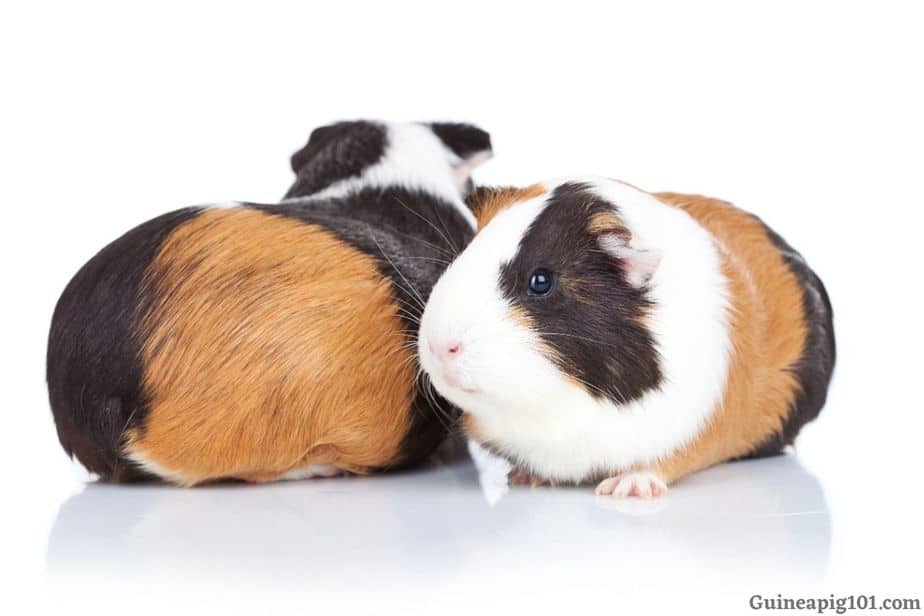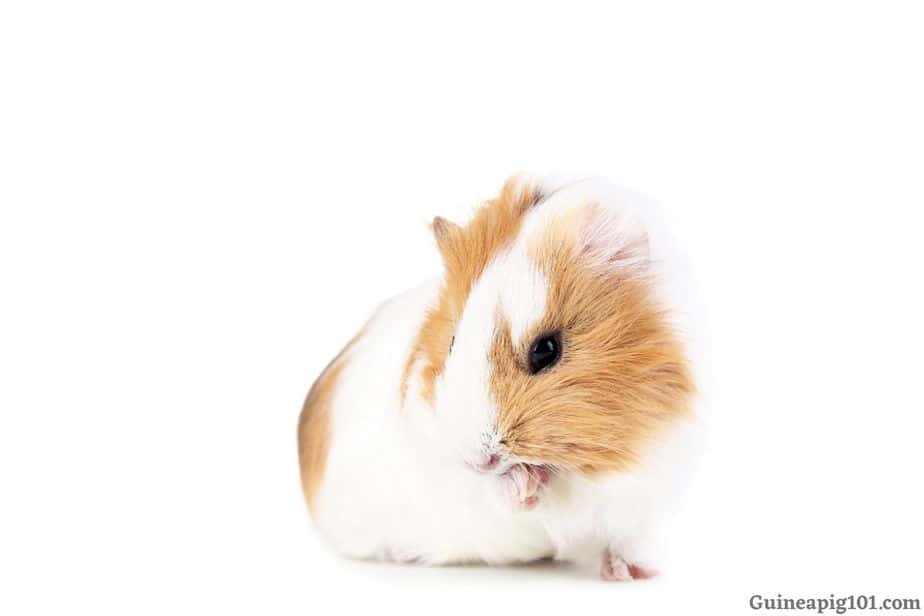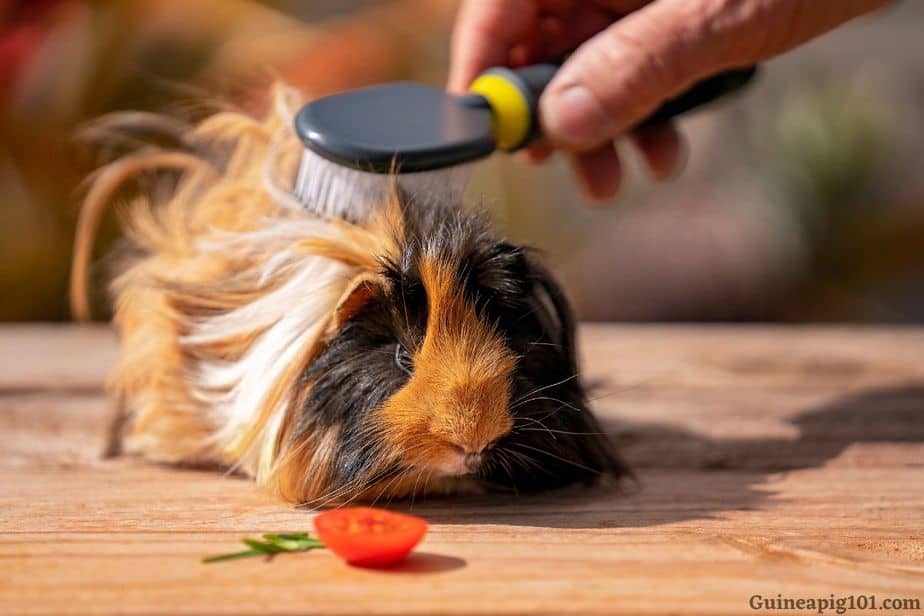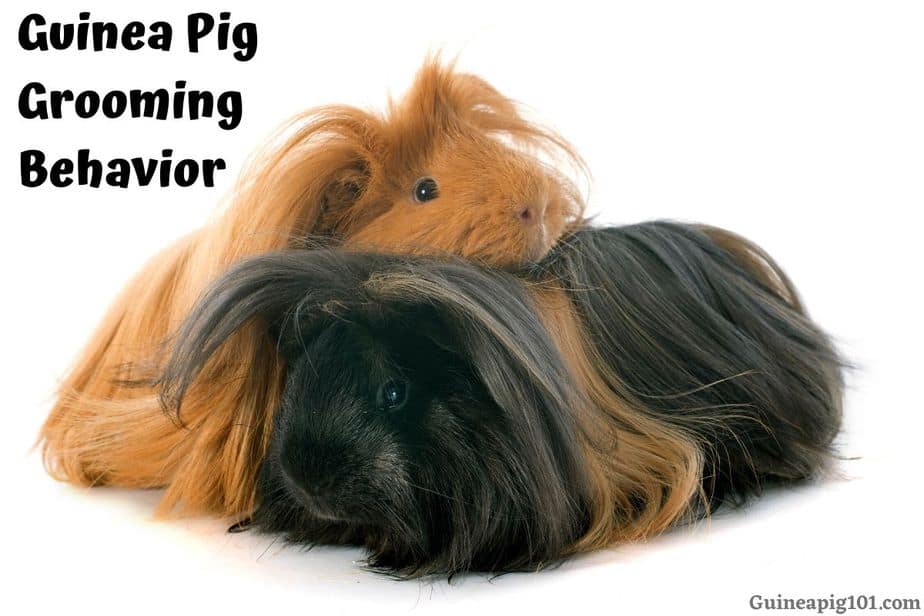Guinea pigs are as tidy as you keep them. Yes, that’s absolutely true. You might notice a little smell from their cage after a few days of cleaning, but you will never notice your guinea pig smelling bad. And this is because guinea pigs spend a good amount of time grooming themselves and their cagemates.
Grooming is a natural behavior in guinea pigs, and they groom themselves several times a day. They also groom their cage mates if they are bonded well. However, you should make sure their grooming doesn’t turn into barbering, as it can be painful for your guinea pigs.
For guinea pigs grooming is not just about staying clean. It’s a way to remain calm and safe as well.
In the wild, guinea pigs used to clean themselves regularly to remove any food particles attached to their fur.
This is a preventive measure in keeping the predators away. Even today, they carry the same instinct.
Guinea pigs also use grooming as a part of their status. In a cage, the submissive guinea pig will always groom the dominant one.
This also helps them in understanding their role in the cage. Some guinea pigs groom each other out of affection too.
Why guinea pigs groom
If you have pet guinea pigs, you must have noticed that they are meticulous groomers.
Guinea pigs also groom their cage mates and human companion as well. Some common types of grooming prevalent in guinea pigs are:
- Self-grooming: when guinea pigs groom themselves.
- Allogrooming: when two or more guinea pigs groom each other.
- Social grooming: when guinea pigs try to groom their owner or human companion.
But why do guinea pigs take grooming so seriously?
- Safety: Guinea pigs are prey animals, and they do need to keep themselves incognito from predators. Grooming plays a vital role in neutralizing the scent and keeping them safe from predators.
- Maintaining Body Temperature: Guinea pigs do not sweat. This means that, in hot weather conditions, guinea pigs need to groom themselves to keep their body cool.
- Shedding: Grooming also helps in getting rid of any excess fur from the body. This is crucial for keeping their body temperature in control.
- Reducing Stress: Grooming is also helpful in self-soothing your guinea pigs. They groom themselves to reduce their stress.
- Love And Affection: Guinea pigs groom their companion to share their passion and affection with each other. It can be compared to a hug.
- Dominance or Hierarchy: Grooming is also helpful in establishing dominance or hierarchy in the cage. The subordinate guinea pig will groom the dominant guinea pig regularly.
Grooming is a vital part of the guinea pig’s routine. If your guinea pig is not grooming correctly, then it might be a sign of some medical concern.
What does it mean when guinea pigs groom each other?

When you keep two or more guinea pigs together in the cage, then they are definitely going to grooming each other.
Self-grooming does help them in keeping themselves clean. However, they cannot reach all parts of their body.
By grooming each other, they can also clean those parts away, which they were not able to do on their own.
In a bonded pair, grooming is also a sign of affection. However, sometimes grooming is a sign of hierarchy in guinea pigs.
The submissive guinea pig always cleans the dominant guinea pigs regularly. This is like a natural power balance in guinea pigs, and you should not be concerned about the same.
Guinea pig licks another guinea pig
It is typical behavior in a group of guinea pigs when they are closely bonded.
When one guinea pigs lick the other guinea pig, they are trying to show some love and affection to their cagemate.
They also help their cagemate groom some parts of the body which a guinea pig can’t reach on their own.
If a mother guinea pig is licking their baby, then it is a part of their nursing behavior to protect their babies, and at the same time, they want to teach their babies to clean themselves.
Sometimes you will also notice that one guinea pig is excessively cleaning other guinea pigs; this usually happens when they find something in their fur or skin.
Something like mites can trigger this behavior in guinea pigs.
You should try to separate them at this stage because excessive grooming can trigger fur loss leaving the skin open and bare for vulnerabilities.
Why do guinea pigs nibble each others ears
In the process of cleaning each other, guinea pigs might nibble on each other’s ear. It is completely normal if your guinea pig is doing it out of affection.
However, sometimes guinea pigs also attack each other ear when they fight.
Ear biting is a common method to prove hierarchy in the cage. The dominant guinea pigs will bite the subordinate guinea pig. This helps them in determining and understanding their role in the cage.
However, It can get severe and may leave an injury mark on your guinea pigs as well.
If you suspect that your guinea pigs fight and show aggression when you are away, then look for the signs of the same.
Scars, bite marks, and scratches around the ear, face, nose, etc. are some common signs you must look at.
Barbering in guinea pigs
Barbering is a common cause of hair loss in guinea pigs.
It usually happens when one guinea pig chews on the hair of other guinea pigs or sometimes even chew on to their own fur resulting in a patch of fur missing.
Some common causes of barbering include:
- Conflicts among guinea pigs
- A way to show physical dominance (When both guinea pigs don’t want to give up)
- Over Grooming themselves or other guinea pigs
- Boredom and loneliness
- Stress in guinea pigs
Sometimes it can be difficult to tell if your guinea pig is grooming or barbering. Often what looks aggressive and dangerous to us may just be fun or sign of play in guinea pigs.
However, if you see that one guinea pig is grooming others aggressively, then keep a close watch on both of them.
If you notice any guinea pig is missing a patch of fur, then it definitely means they are being barbered.
You might need to step in and protect the guinea pig if it continues. Watch their behavior and see the response of the guinea pig being barbered.
Sometimes a submissive guinea pig will allow the dominant guinea pigs to barber them without any complaint. While other times they run away and hide.
In such a scenario, you might need to separate the barbered guinea pig and provide them with additional care for them to recover back.
By watching their behavior for some time, you will be able to tell the difference between grooming and barbering in guinea pigs.
If they are grooming each other regularly, then it might be out of affection.
However, if your guinea pigs only interact to groom, that doesn’t last long, then it probably is a sign of barbering.
Guinea pig pulling its fur out

Sometimes guinea pigs pull out their own fur, or you can say that they start barbering themselves.
There can be a lot of reasons for the same, and you need to evaluate the reason behind to find a possible solution.
Some of the common causes include:
- Boredom
- Stress or depression
- Loneliness
- Mites or parasites in the fur
- Itchiness due to dry skin
- Physical injury
There are some of the most common reasons for self barbering. If you notice that your guinea pig is barbering their own hair, you might need to consult a vet first.
They can do a thorough examination to find out if they have any physical or medical problems triggering the behavior.
If the vet is unable to diagnose any physical trauma, then it means it is a mental one.
You must then lookout for signs of stress and depression in guinea pigs.
Are they lonely? Do they get enough floor time and exercise? Do they have enough toys to play with?
These are some of the common questions you need to find the answer for.
Once you find the cause of fur pulling, you can take appropriate action to fix the problem of fur pulling in your guinea pigs.
Do guinea pigs groom themselves?
Yes, guinea pigs can take care of most of their grooming needs. They will clean every part of their body multiple time a day.
However, there are sometimes when they cannot clean themselves and will require some help.
For example: An overweight guinea pig will struggle to clean their bum and legs. Also, old guinea pigs have a hard time keeping up with their grooming needs.
Thus, under such circumstances, you should not rely on your guinea pigs to groom themselves, and you should reach out to them for help.
But how will you know when does your guinea pig needs help in grooming?
I know it can be challenging to understand the same, so, here is a simple checklist that can help you determine when your guinea pig need help:
- Is your guinea pig’s fur bright and shiny?
- Did you notice any matt in the hair?
- Are your guinea pig’s legs and tummy clean? (look for stains of pee)
- Does your guinea pig have a wet bottom?
- Is your guinea pig missing a patch of fur?
A dirty guinea pig can attract pests like flies, rats, etc. It also increases the chances of flystrike, which can be deadly for them.
Thus, It is essential to look out for these signs and help your guinea pigs out in grooming them. Most guinea pigs enjoy grooming.
It also helps you build a bond with your guinea pigs.
If you don’t groom your guinea pigs, they might feel sad and get depressed. It can make them aggressive or ill in the long run.
Do guinea pigs need to be groomed?

As we discussed earlier, most of the basic grooming can be taken care of by our guinea pigs.
However, there is some aspect that we need to help them out with.
In captivity, guinea pigs cannot file their nails, and they cannot take a bath on their own.
So, you must take care of these basic hygiene needs of your guinea pigs.
These needs include:
- Nail clipping: It needs to be done on a bi-weekly basis.
- Brushing: Once a month for the short-haired breed and One-Two times a week for the Long-haired breed.
- Bathing: Only when needed for the short-haired breed and once in 2-3 months for the Long-haired breed.
- Hair clipping: Once a month or whenever needed for the Long-haired breed.
Although grooming is essential, you need not groom them daily. Most of these can be done on a weekly or monthly basis.
So, you can set a routine for grooming your guinea pigs and follow the same to ensure your guinea pigs look fresh and clean.
How to groom your guinea pig?
Grooming is essential for guinea pigs and you will definitely need some tools for grooming your guinea pigs.
Check our essential supply list to find all the grooming supplies you will need to groom your guinea pigs.
When you are ready to groom your guinea pigs then you can follow the following steps:
- Start by holding your guinea pigs firmly. You can use a towel for a firm and easy grip.
- Now take a brush and start brushing your guinea pigs. Start from the head and move straight towards their bum. You can brush them once a week or more frequently as needed.
- Check your guinea pig’s bum, belly, and legs. If all the body parts are clean and free from any dirt or stains, you can leave it; however, if you find some urine or dirt stains then use a damp cotton pad to clean the same.
- Once done, you can look at their nails. If you find the nails are overgrown, you can file down the same.
- Then move onto their grease glands. If you find the grease glands are dirty, then go ahead and give it a rinse.
- You may also need to clip the hairs of your guinea pigs. This step depends upon the breed of your guinea pigs. Only long-haired guinea pigs need their hair clipped.
- Lastly, you might need to check for signs of bad smell. If you feel your guinea pig fur is soiled and they smell bad, then you need to bath them. Else don’t bath them.
Sources: PRELIMINARY STUDIES OF GROOMING BEHAVIOR OF DOMESTIC AMERICAN GUINEA PIG, The effect of human interaction on guinea pig behavior, Guinea pig behavior, Petsaver guinea pig guide, Guinea pig care, GUINEA PIG GENERAL CARE GUIDE, The effects of lowering the bath temperature
